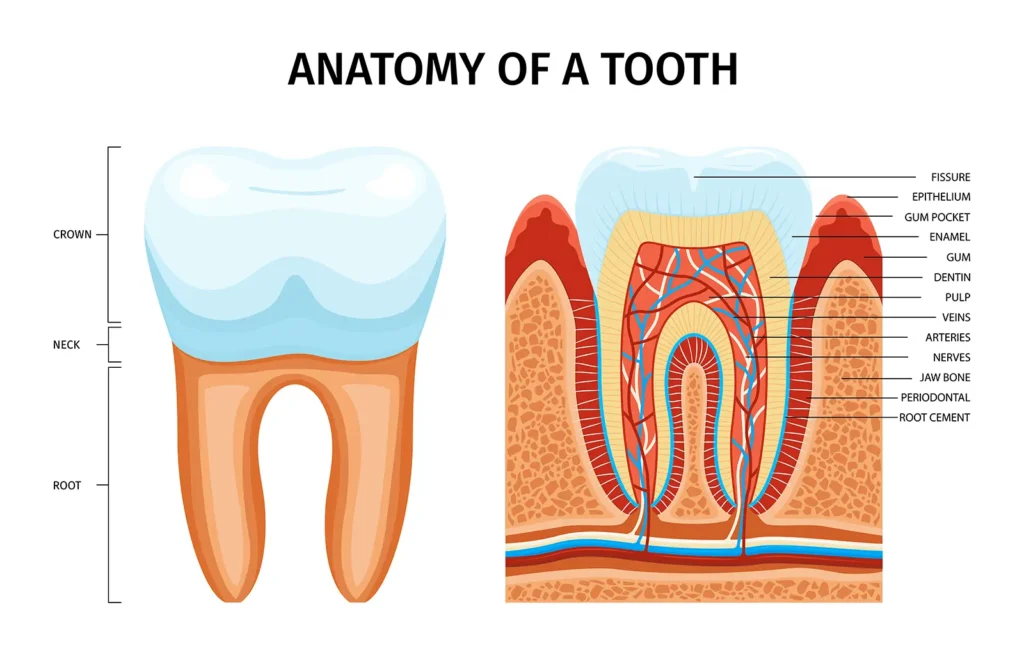Maintaining strong, healthy teeth is crucial for overall oral health and well-being. Knowing how to strengthen teeth is essential because strong teeth not only enhance your smile but also help you chew food properly, speak clearly, and maintain the structure of your face. Weak or damaged teeth can lead to a host of dental problems, including cavities, gum disease, and tooth loss. This comprehensive guide from Big Sky Family Dental will explore various ways to strengthen teeth and maintain optimal oral health. Whether you’re looking to improve your dental routine or seeking professional advice, we’ve got you covered.
Understanding Tooth Strength
Teeth are composed of several layers, each contributing to their overall strength and function:
- Enamel: The outermost layer, enamel, is the hardest substance in the human body. It protects the inner layers of the tooth from decay and physical damage.
- Dentin: Beneath the enamel lies dentin, a softer layer that supports the enamel and carries nerve signals.
- Pulp: The innermost part of the tooth, the pulp, contains nerves and blood vessels that nourish the tooth.
- Cementum: Covering the tooth’s root, cementum helps anchor the tooth within the jawbone.
Strengthening teeth involves protecting and maintaining the integrity of these layers, particularly the enamel.

How to Strengthen Teeth
1. Practice Good Oral Hygiene
Maintaining a rigorous oral hygiene routine is the foundation of strong, healthy teeth. Here are some essential practices:
- Brush Regularly: Brush your teeth at least twice a day using fluoride toothpaste. Fluoride helps strengthen enamel and makes it more resistant to decay.
- Floss Daily: Flossing removes plaque and food particles from between teeth and along the gumline, areas where your toothbrush can’t reach.
- Use Mouthwash: An antibacterial mouthwash can help reduce plaque and bacteria in the mouth, further protecting your teeth.
2. Eat a Balanced Diet
Your diet plays a significant role in the health of your teeth. Consuming nutrient-rich foods can help strengthen your teeth and improve overall oral health:
- Calcium-Rich Foods: Dairy products like milk, cheese, and yogurt are excellent sources of calcium, which is essential for strong teeth and bones. Leafy green vegetables, almonds, and tofu are also good sources of calcium.
- Phosphorus-Rich Foods: Foods like meat, fish, eggs, and nuts contain phosphorus, a mineral that works with calcium to strengthen teeth.
- Vitamin D: This vitamin helps your body absorb calcium. Sunlight exposure and foods like fatty fish, egg yolks, and fortified cereals can boost your vitamin D levels.
- Vitamin C: Found in citrus fruits, strawberries, and bell peppers, vitamin C is crucial for healthy gums and can help prevent gum disease.
- Avoid Sugary Foods and Drinks: Sugary foods and beverages can lead to tooth decay. Bacteria in your mouth feed on sugar, producing acids that erode enamel.
3. Stay Hydrated
Drinking plenty of water is beneficial for your overall health and oral health. Water helps wash away food particles and bacteria, reducing the risk of tooth decay and gum disease. It also promotes saliva production, which is essential for neutralizing acids and protecting enamel.
4. Avoid Harmful Habits
Certain habits can weaken your teeth and increase the risk of dental problems:
- Avoid Smoking and Tobacco Use: Tobacco products can stain your teeth, contribute to gum disease, and increase the risk of oral cancer.
- Limit Alcohol Consumption: Excessive alcohol intake can lead to dry mouth and increase the risk of tooth decay.
- Avoid Using Teeth as Tools: Using your teeth to open bottles, tear packages, or bite hard objects can cause chips and cracks.
5. Use Fluoride Products
Fluoride is a mineral that helps strengthen enamel and prevent tooth decay. Incorporate fluoride into your oral care routine by:
- Using Fluoride Toothpaste: Choose a toothpaste that contains fluoride to help protect and strengthen your teeth.
- Drinking Fluoridated Water: Many public water supplies contain added fluoride, which can help reduce cavities.
- Professional Fluoride Treatments: Ask your dentist about professional fluoride treatments, especially if you are at high risk for cavities.
6. Consider Dental Sealants
Dental sealants are thin, protective coatings applied to the chewing surfaces of the back teeth. Sealants can help prevent cavities by shielding these areas from plaque and bacteria. They are especially beneficial for children and teenagers but can also be used for adults at risk of decay.
7. Protect Your Teeth During Physical Activities
If you participate in sports or other physical activities, wearing a mouthguard can help protect your teeth from injury. Custom-fitted mouthguards from your dentist offer the best protection.

Regular Dental Visits
Regular dental check-ups are essential for maintaining strong, healthy teeth. At Big Sky Family Dental, our team provides comprehensive care to help you achieve and maintain optimal oral health:
- Professional Cleanings: Regular cleanings remove plaque and tartar buildup that cannot be eliminated by brushing and flossing alone.
- Examinations: Routine exams allow your dentist to detect early signs of tooth decay, gum disease, and other dental issues. Early detection and treatment can prevent more severe problems.
- X-Rays: Dental X-rays provide a detailed view of your teeth and jawbone, helping your dentist identify issues that are not visible during a regular exam.
- Personalized Advice: Your dentist can provide personalized recommendations for improving your oral hygiene routine and strengthening your teeth.
Addressing Dental Problems
If you experience any dental issues, addressing them promptly is crucial for maintaining strong teeth:
- Treat Cavities: Cavities should be filled promptly to prevent further decay and damage. Your dentist will remove the decayed portion of the tooth and fill it with a suitable material.
- Root Canal Therapy: If tooth decay reaches the pulp, a root canal may be necessary to remove the infected tissue and save the tooth.
- Gum Disease Treatment: Treating gum disease early can prevent tooth loss and other complications. Your dentist may recommend deep cleaning, medication, or other treatments.
- Repair Damaged Teeth: Cracked or chipped teeth can weaken over time. Dental crowns, bonding, or other restorative treatments can help protect and strengthen damaged teeth.
Conclusion
Strengthening your teeth is a lifelong commitment that requires good oral hygiene, a balanced diet, and regular dental care. By following the tips outlined in this article, you can help ensure your teeth remain strong and healthy throughout your life. Remember, a healthy smile starts with strong teeth and excellent oral health habits.
At Big Sky Family Dental, we are dedicated to helping you achieve and maintain optimal oral health. Whether you need a routine check-up, professional cleaning, or specialized treatment, our team is here to provide the care and guidance you need. If you have any questions about how to strengthen teeth or need personalized advice, don’t hesitate to contact us. We’re here to support you on your journey to a healthy, beautiful smile.


